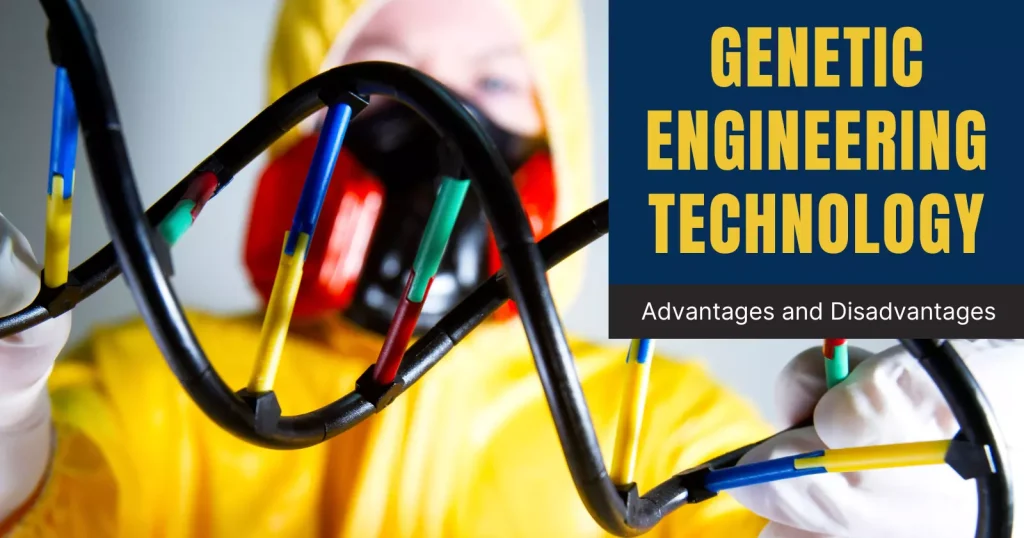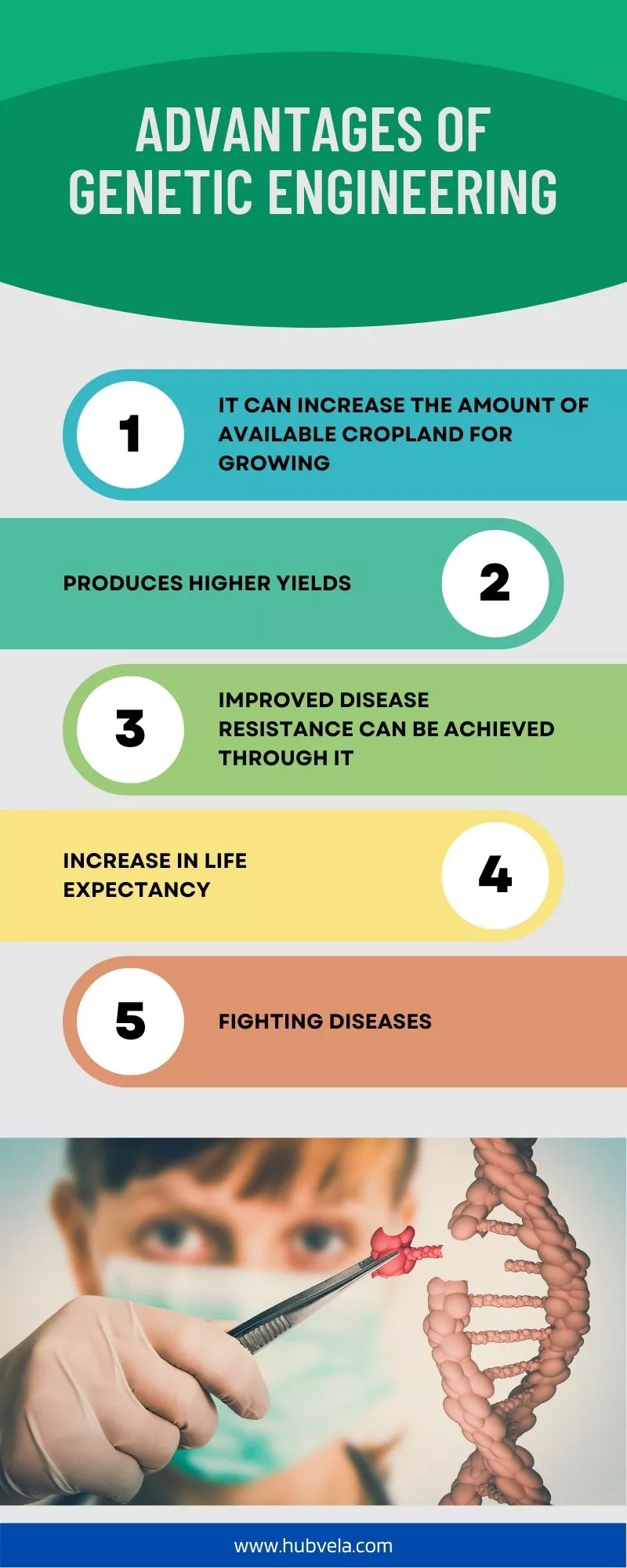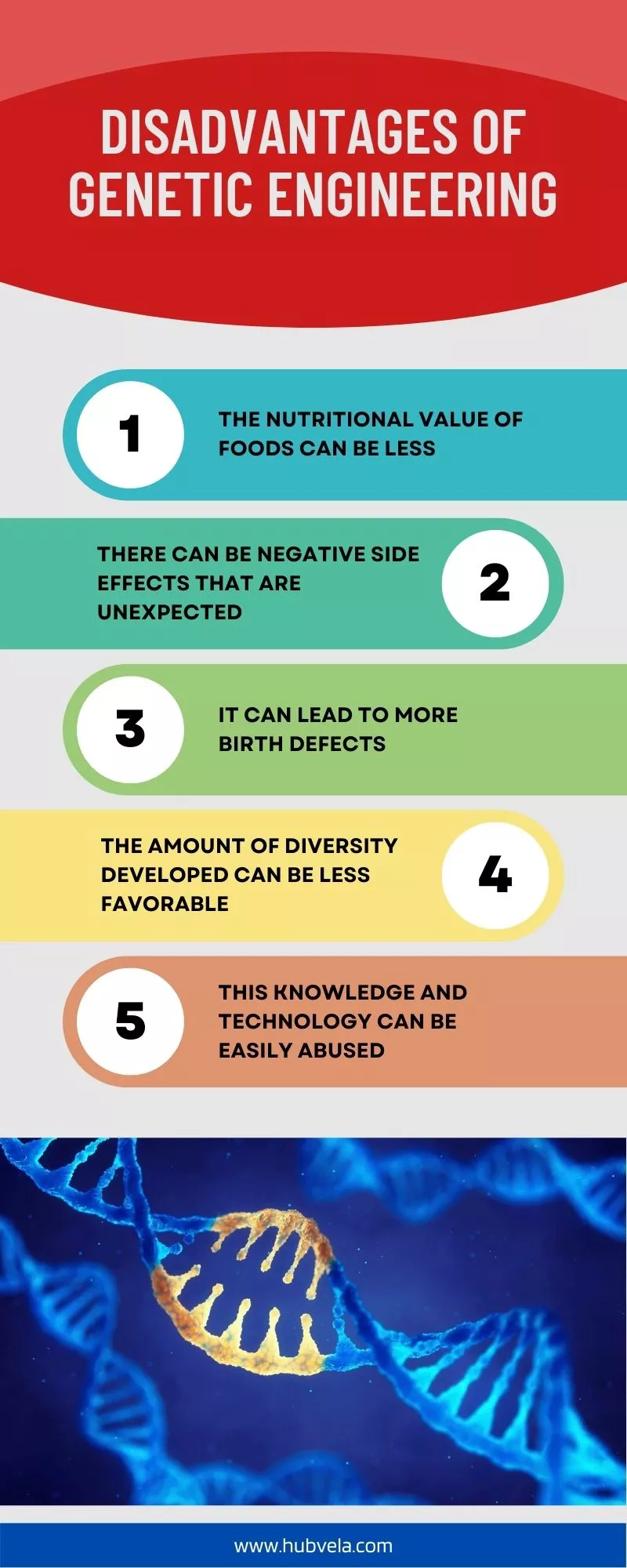As technology advances, the capacity of humankind to manipulate the environment and its inhabitants also increases in ways previously unimaginable.
Genetic engineering is one such technological advancement that has opened up a world of opportunities but it has also posed a fair share of challenges. Those seeking to understand the intricacies of genetic engineering must evaluate not only its potential benefits but also its potential drawbacks.

--Advertisement--
Advantages of Genetic Engineering
The most obvious advantage is the potential for improving existing crop varieties or even creating entirely new ones.
Genetic engineering can enhance essential characteristics such as taste, size, and nutritional value while eliminating undesirable traits like allergens or toxins. This could result in higher yields and more nutritious crops that can offer greater sustenance for global populations.
Furthermore, genetic engineering could open up possibilities for developing new treatments for diseases as well as other medical applications such as gene therapy.

1. It can increase the amount of available cropland for growing
The advantages of genetic engineering are manifold and undeniable. Its utilization has enabled humanity to reap benefits from its application in the agricultural sector, specifically when it comes to increasing the amount of available cropland for cultivation.
This remarkable technology has revolutionized traditional farming practices, allowing farmers to maximize their potential yields more while freeing up more space for growing food crops.
Through strategic gene manipulation, scientists have engineered faster-growing plants that require less water and fewer resources than their non-genetically modified counterparts.
This has served as an invaluable resource amidst drastic climatic changes which have made traditional farming methods increasingly difficult and time-consuming.
Moreover, the introduction of genetically modified crops into the marketplace has provided a more cost-effective solution for farmers who may have limited funds but still want to produce large quantities of food crops with minimal effort.
2. Produces higher yields
The advent of genetic engineering has brought about a revolution in agriculture, with far-reaching benefits for producers and consumers alike.
Genetic engineering offers the potential to increase crop yields exponentially by introducing desirable traits such as drought tolerance, pest resistance, and improved nutrition from plants.
Through this technology, farmers can cultivate more resilient crops with higher yields at lower costs than ever before.
Utilizing genetic engineering techniques, scientists are able to modify existing plant genomes or even create entirely new species that could not exist in nature due to natural crossbreeding constraints.
This opens up a world of possibilities; enabling farmers to manipulate the genetics of their crops to produce higher yields while decreasing environmental damage caused by chemical pesticides and fertilizers.
Additionally, through genetic engineering, crops can be engineered for better nutrient profiles or tailored to specific climatic conditions and soil types in order to maximize yield efficiency.
3. Improved disease resistance can be achieved through it
Genetic engineering has become a powerful tool in modern medicine, now allowing us to manipulate the genetic makeup of organisms and significantly enhance their resistance to disease.
Recent advances in gene-editing technologies such as CRISPR allow scientists to rapidly modify the genetic code of microorganisms, plants, and animals, creating more robust and resilient life forms.
Researchers have managed to successfully introduce new gene sequences into organisms with remarkable precision – a process known as ‘gene insertion’.
This has allowed them to create strains that are more capable of resisting disease due to their strengthened immune systems.
For instance, scientists have developed genetically modified salmon which can combat highly infectious bacterial infections more effectively than non-modified fish species.
Similarly, researchers have also worked on developing GM crops that can withstand viruses better than varieties grown from traditional seed stock.
4. Increase in life expectancy
As technology continues to rapidly advance, so too does the potential for humans to manipulate the environment and ultimately themselves.
In an era of genetic engineering breakthroughs, life expectancy is no exception and has seen a dramatic increase in recent years.
Genetic engineering has opened up endless possibilities for scientists around the world. From manipulating our own genes to better understanding how diseases are transmitted, it has been instrumental in helping us gain greater control over our own evolution as a species.
By studying our genetic makeup and utilizing this knowledge through molecular manipulation, we can create therapies that can extend life expectancy beyond what was once thought impossible.
The ability to modify certain genes may even allow us to erase certain age-related afflictions from existence altogether.
5. Fighting diseases
The fight against diseases has been a part of human history for centuries, and modern science has equipped us with the knowledge and technology to tackle illnesses from every angle.
With advancements in genetic engineering, we can now pinpoint specific genes in organisms linked to certain diseases. Through precise manipulation of these genes, scientists can create treatments that may prevent or cure diseases at their source.
As our understanding of genetics continues to evolve, so do our capabilities for thwarting deadly illnesses. By combining cutting-edge techniques like CRISPR/Cas9 gene editing with traditional pharmacological approaches, researchers are making groundbreaking strides toward effectively fighting off some of the most devastating conditions known to humankind.
In addition, this research is also creating a more nuanced understanding of how diseases manifest and spread throughout populations—knowledge that could prove invaluable as new threats emerge on the horizon.
Disadvantages Of Genetic Engineering
For centuries, we have been harnessing the power of genetic engineering to modify plants and animals to suit our needs.
But this powerful tool is not without its drawbacks. From ethical concerns to potential health risks, understanding the disadvantages of genetic engineering is key for those who wish to use it responsibly.
A major disadvantage of genetic engineering lies in the ethical considerations surrounding it.
Many worry that tinkering with a species’ natural genome could lead to unforeseen consequences, from the destruction of biodiversity due to unchecked crossbreeding and hybridization, to the creation of new organisms with unknown effects on their environment or other organisms nearby.
Furthermore, there are considerations of consent when introducing these changes into an organism’s DNA – something that cannot be asked for as a species does not have the capacity for such communication.

1. The nutritional value of foods can be less
When discussing the disadvantages of genetic engineering, one of the more overlooked topics is the nutritional value of certain foods.
As more food producers rely on genetically modified organisms and hybridized plants to meet consumer demands, there has been a decline in the nutritional quality of some foods.
This decrease can be attributed to several factors that are specific to farm-grown and manufactured goods.
Genetically engineered foods are often created with one goal in mind: quicker production at a lower cost. Such modifications may include increasing crop yield or developing stronger pest resistance; however, these alterations do not prioritize the health benefits for consumers.
Additionally, hybridization techniques used by farmers can reduce nutrient content as well as introduce potential allergens into food products without proper testing or labeling.
As a result, shoppers may unknowingly purchase items with reduced vitamin and mineral content while believing they’re making healthy choices.
2. There can be negative side effects that are unexpected
The most concerning aspect of genetic engineering is its potential to cause inadvertent and unforeseen mutations in organisms at the cellular level.
This could have drastic implications not only for individuals but also for entire populations by introducing lethal new traits or creating an ecological imbalance in species’ interactions.
Furthermore, these changes may be irreversible once released into nature due to their rapid replication that can quickly spread across immense distances.
As well as this, there are ethical implications associated with manipulating genes which must be considered when considering any use of genetic engineering.
3. It can lead to more birth defects
One of the most concerning issues is that genetic engineering can lead to more birth defects in humans and other species.
The risks posed by manipulating genes are manifold, ranging from potentially fatal errors arising from incorrect gene splicing to damaging mutations caused by chemical imbalances during the process.
In particular, defective embryos created through genetic engineering may carry a greater risk of developing serious congenital defects that could seriously affect their health or even prove fatal in some cases.
Furthermore, a botched procedure might even introduce new genetic conditions into the gene pool of an entire species – something which cannot be reversed once done.
4. The amount of diversity developed can be less favorable
There are significant disadvantages to genetic engineering which can lead to less favorable outcomes.
The most pressing concern is that interfering with the natural order of genetics could result in unexpected consequences.
For example, altering genetic material could lead to changes in species’ behavior or characteristics that we did not anticipate.
It may even cause them to become more vulnerable or prone to disease and infections due to their weakened immune system.
Additionally, using these methods indiscriminately could result in significant disruption of local ecosystems as species begin competing for resources amongst each other in entirely new ways than before.
5. This knowledge and technology can be easily abused
In the modern world, technology has opened up a myriad of possibilities. But with any great potential come potential dangers.
While genetic engineering offers numerous advantages, it also can be easily abused. Scientists have to be judicious in their application of this technology and understand its ethical implications in order to prevent misuse or abuse.
Much like how advanced computer programming allows hackers to break into systems, manipulating genetic information can lead to findings that are used for nefarious purposes.
For example, some countries may use genetic engineering as a form of eugenic manipulation – where certain people are “bred” with specific traits deemed desirable by those in power.
This could lead to the creation of an unjust society and ultimately result in a tragedy worse than what we’ve seen before.
Conclusion on the Advantages and Disadvantages of Genetic Engineering
In conclusion, genetic engineering has its advantages and disadvantages. It has the potential to cure serious diseases, improve crop yields and create new forms of life. But it also poses a number of ethical and environmental issues that can not be overlooked.
On the one hand, genetic engineering holds great promise in terms of accessing new sources of energy, creating vaccines for previously untreatable illnesses, and providing solutions for food shortages.
On the other hand, there are risks associated with introducing gene-edited organisms into the environment or human genome which could have unintended consequences on our health or ecology.
Ultimately, it is important to weigh all options carefully before implementing any kind of genetic engineering technology.
While there may be benefits in certain areas, we must remain vigilant about its potential drawbacks in order to ensure safety and sustainability while reaping its rewards now and into the future.


